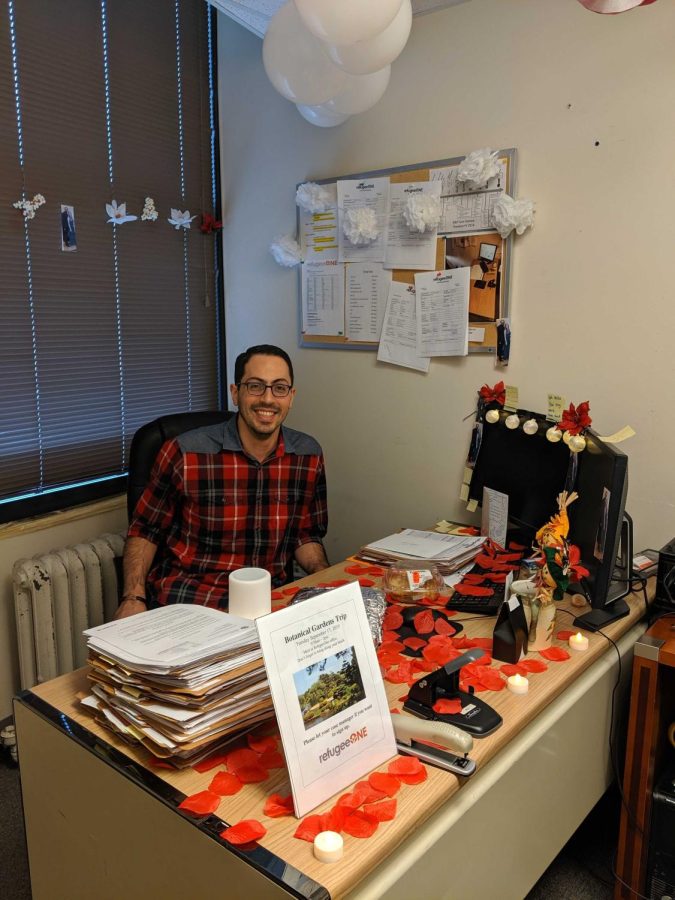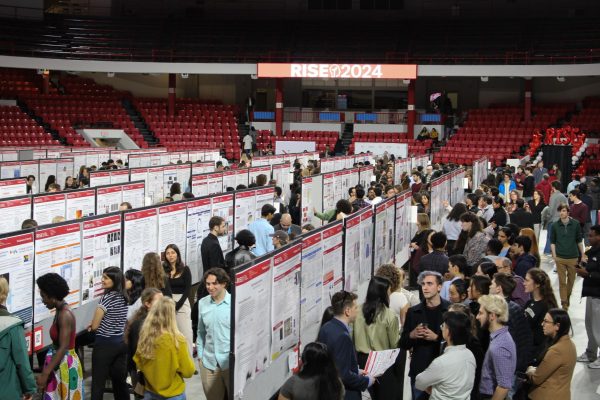Op-ed: Northeastern can open educational pathways to refugees
Tarokh in his office where he worked as a refugee case manager prior to pursuing his doctorate at Northeastern University.
April 13, 2023
Next year, I will receive my doctoral degree in law and policy from the Northeastern University College of Professional Studies, although my educational path was more challenging than many other students. The College of Professional Studies gave me this chance to pursue my dream; I believe Northeastern can do more to create better educational paths and opportunities for vulnerable populations.I am from Iran and came to the United States 10 years ago as a refugee. I grew up under a discriminatory educational system. Iran’s regime’s Islamic ideology heavily influences the system, from toddler programs to higher education, to create ideological forces for its totalitarian system. Still, I was unaware of this ideological system designed to brainwash us until I was banned from studying at Iran’s universities because of my reformist political activities. At the same time, I was a top student in political science. Even now, many students, such as those who believe in the Baháʼí faith, are not allowed to attend college or university because of their beliefs.
When I arrived in the United States in 2012, I wanted to continue my education in political science and get my master’s degree as soon as possible. I took English as a Second Language, or ESL, classes immediately, but when it was time to apply for university, the process was very complicated for someone like me, who was unfamiliar with this country’s education system. Navigating the website, preparing the requirements, getting recommendation letters while no one knew me and transferring my credits from Iran to here while the regime forced me to leave my country were all huge challenges in my educational path.
When I became a case manager for refugees from Afghanistan, Iran, Iraq, Syria and some eastern European countries, I realized many of my clients were worried about their educational path. Many of them had to leave their countries before finishing their l degrees. Many did not have access to their old universities to request course credential letters after escaping from war, or the regimes confiscated all their documents, including their diplomas. They wanted to return to school and complete their education immediately. Despite their challenges, U.S. colleges and universities were not ready to accept refugees.
Most of the time, adult refugees have a limited chance to pursue their educational goals. The refugee reception and placement, or R&P, is a federal program to provide core services, such as case management, housing and employment services to new refugees within the first three months of their arrival. Each state with the resettlement program conducts the program through local agencies. According to the local refugee resettlement agencies’ contract with the federal government, they are required to assist refugees with ESL classes. However, R&P’s goal is self-sufficiency and it has been designed to push refugees to get a job as soon as possible and become independent from the public benefits.
In other words, the local agencies provide intensive ESL classes to refugees and prepare them for the work market. Refugees with advanced English skills are forced to get the first available jobs; otherwise, they would lose their benefits, especially rent assistance.
Getting back on the educational track is enormously tricky for adult refugees. Usually, first generation refugees are forced to sacrifice their educational dreams in order to survive by working entry-level jobs. Many stay in these entry-level positions for life, sometimes working two shifts to afford costs of living. In their scarce spare time, some refugees, if they are lucky, could get a job in their field, but are underpaid because their degree is not from a U.S. academic institution.
Northeastern University, as one of the most globally-recognized t universities in the U.S., can take some initiative steps to support adult refugees as they pursue their educational dreams and create some educational support for this vulnerable population. For example, the university could provide a web page that is easy to navigate with all resources for refugees, such as application fee waivers, and creating a notable exception of transferring their degrees from their home universities. Northeastern could make a refugee fund or scholarship, or allocate some tuition discount like the Full Circle Scholarship, which offers a 25% tuition discount to graduate applicants involved with some programs, such as Peace Corps and Ameri Corps. In the long term ,the university can expand its relationship with other federal agencies which are involved in resettling refugees in the United States, and establish higher educational assistance for them.
Ali Tarokh is a doctoral candidate in law and policy at Northeastern University and an Iranian American who lives in Chicago. He can be reached at [email protected].


















